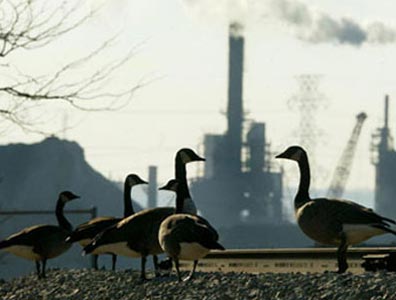 New Delhi:
New Delhi: While supporting the extension of Kyoto Protocol, Britain says it won't be good for the European Union (EU) to sign up for a second commitment to the only legally binding agreement on emission cuts if the US and other major economies do not follow suit.
Britain's Minister of State for Climate Change Gregory Barker, on a visit here, told FnF that his country, and the 27-nation EU, are ready for a global agreement on climate change, but other countries seem less enthusiastic.
That is where progress has to be made at the United Nations Framework Convention on Climate Change (UNFCCC) Conference of Parties 17 (COP 17) to be held Nov 28-Dec 10 in Durban, South Africa, he said.
The extension of the Kyoto Protocol, which was initially adopted in 1997, will be a major issue at the Durban conference, as the first commitment period of the only agreement that talks about legally binding cuts by developed countries - which are historic polluters - expires by the end of 2012.
"The UK along with the rest of the EU is open to the second commitment period for Kyoto Protocol. EU has signalled its willingness to provide leadership, but leadership requires others to follow and it's no good deal that the EU signs up for a second commitment if that commitment isn't matched in other ways by other economies," Barker told IANS in an interview.
However, he said Britain is not looking at India to take make emission cuts. "I don't think we are looking at India to make emission cuts...we fully recognise that India has a long way to go in developing its economy and raising the living standards of its people."
The minister is on a six-day visit to India, aiming to boost ties between the two countries on green issues.
Noting that Kyoto signatory countries account for less than 15 percent of the global emissions, Barker underscored that a global agreement on climate change has to be seen in this context.
Developed countries like the US, Japan, Russia and Australia have been demanding a new treaty which ensures legally binding emission cuts by the developing world, including India and China. The US is one of the major polluters that has not yet ratified the protocol while over 190 countries have done so.
"KP (Kyoto Protocol) only divides some of the developed and developing countries and there is a very substantial amount of countries completely excluded like the US and other major economies. To just focus on developed countries misses the fact that the second commitment period of KP could be a useful stepping stone and only a stepping stone to the global treaty, but we need to get the whole global community on the same page," Barker said.
According to the minister, it is important to have an international agreement which makes other major emitters, the developed world as well as developing nations, act together on the basis of common but differentiated responsibility.
On Britain's expectations from the Durban talks, Barker said: "We need to make good progress certainly to operationalise the 2010 Cancun climate summit agreements, to understand the actions needed to ensure that we keep the global temperature rise below 2 degrees and to make more progress on REDD (reducing emissions from deforestation in developing countries) plus (supporting action to avoid deforestation)."
"Obviously, the green fund is an important issue and the UK has committed to 2.9 billion pounds ($5 billion) to our own international climate fund (ICF), including 300 million pounds of fast start finance to drive climate mitigation and adaptation action in developing countries," he said.
Barker said the 2.9 billion pounds earmarked by the British government are old funds repackaged as climate funding.
He said with the ongoing financial crisis in Europe, his government is planning to rope in private companies for investing in green energy in developing countries.
 New Delhi: While supporting the extension of Kyoto Protocol, Britain says it won't be good for the European Union (EU) to sign up for a second commitment to the only legally binding agreement on emission cuts if the US and other major economies do not follow suit.
New Delhi: While supporting the extension of Kyoto Protocol, Britain says it won't be good for the European Union (EU) to sign up for a second commitment to the only legally binding agreement on emission cuts if the US and other major economies do not follow suit.